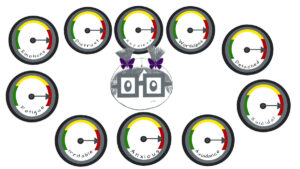What Exactly is Depression?
 What exactly is depression? I have depression and want to understand what is happening within my mind. For me, knowledge is the power to change, at the very least, manage what is happening within my brain.
What exactly is depression? I have depression and want to understand what is happening within my mind. For me, knowledge is the power to change, at the very least, manage what is happening within my brain.
What happened to my brain? Why is it like this, which is to say, why am I like this?
I don’t like having depression. But then again, who does? Not one person that I have spoken to likes having depression, being depressed, or anything about depression at all.
The National Institutes of Mental Health (NIMH) defines depression as:
“Depression (also known as major depression, major depressive disorder, or clinical depression) is a common but serious mood disorder. It causes severe symptoms that affect how a person feels, thinks, and handles daily activities, such as sleeping, eating, or working.”
Signs and Symptoms
The signs and symptoms of depression are wide and varied. The key, according to professionals, is that you have to have these symptoms every day for two weeks. Here is a brief list from NIMH’s website:
- Persistent sad, anxious, or “empty” mood
- Feelings of hopelessness or pessimism
- Feelings of irritability, frustration, or restlessness
- Feelings of guilt, worthlessness, or helplessness
- Loss of interest or pleasure in hobbies and activities
- Decreased energy, fatigue, or feeling slowed down
- Difficulty concentrating, remembering, or making decisions
- Difficulty sleeping, waking early in the morning, or oversleeping
- Changes in appetite or unplanned weight changes
- Physical aches or pains, headaches, cramps, or digestive problems that do not have a clear physical cause and do not go away with treatment
- Thoughts of death or suicide or suicide attempts
Depression can also involve other changes in mood or behavior that include:
- Increased anger or irritability
- Feeling restless or on edge
- Becoming withdrawn, negative, or detached
- Increased engagement in high-risk activities
- Greater impulsivity
- Increased use of alcohol or drugs
- Isolating from family and friends
- Inability to meet the responsibilities of work and family or ignoring other important roles
- Problems with sexual desire and performance
Nuances of Depression
NIMH’s definition sounds straightforward. But it isn’t. There are multiple subcategories of depression, like seasonal affective disorder, persistent depressive disorder, etc.
In addition to subcategories, are many (oh, so many!) ways depression manifests, as you can see from the list.
The number of symptoms makes it hard to determine when you or someone you love has depression. For one, look at all the symptoms you or I must know to figure out something is happening.
What Exactly is Depression?
I have shared NIMH’s definition of depression. It is a very clinical definition. Here is my definition:
Depression is the effect of the brain trying to regulate a dysregulated system. Those attempts at regulation manifest as soul-sucking darkness. Within that darkness are the symptoms of depression, overwhelming feelings of worthlessness, anger, etc. Those symptoms become the focal point because those symptoms overload the system.
Take it from me, someone with depression. The valleys of depression will take you out at the knees, forcing you down into the depths of darkness. But unfortunately, the “official” diagnosis is not descriptive enough for anyone to understand what having depression is all about.
But I suppose the official definition of depression isn’t supposed to help people to understand. It’s for insurance companies to deny or approve your treatment.
Statistics from NIMH: An estimated 21.0 million adults in the United States had at least one major depressive episode. This number represented 8.4% of all U.S. adults.
Thinking I could power through my depression was a fool’s errand. I did not have the tools. Therapy is the best place to start healing.
I recommend Online-Therapy.* 
Check Out My Other Writing
You can also check out my recent poetry:
* I receive compensation from Online-Therapy when you use my referral link. I only recommend products and services when I believe in them.

0 Comments